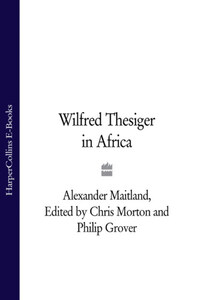The greatest traveller of the twentieth century and one of its greatest explorers, Sir Wilfred Thesiger is most famous for his journeys in Arabia and his sojourns among the Marsh Arabs in Iraq. Yet fifty of Thesiger’s seventy years living, travelling and exploring in remote places were spent in East and North Africa. Thesiger was born in 1910 at Addis Ababa and lived there until 1919 when his family returned to England. Throughout his life, Thesiger continued to revisit Ethiopia, which he preferred to call by its former name Abyssinia. In 1944 he achieved his boyhood ambition of living and working in Ethiopia; however, this was in wartime when he felt that he might have been employed more usefully elsewhere. From 1960 to 1963 and from 1968 to 1977 he travelled each year, on foot, using camels to carry baggage, in northern Kenya. From 1978 to 1994, he settled at Maralal in Kenya’s Eastern Rift Valley Province, among the cattle-owning Samburu. It was there, among his Samburu and Turkana adoptive ‘families’, that he wished to spend his final years.
From 1919 to 1933 Thesiger was educated in England, first at St Aubyn’s preparatory school in East Sussex, and later at Eton College, followed by Magdalen College, Oxford, where he read Modern History. Thesiger’s 1930 autumn term at Oxford was interrupted by Haile Selassie’s coronation, to which he was invited both by the Emperor himself and the Foreign Office as Honorary Attaché to HRH the Duke of Gloucester, who headed the British Mission.
Dressed in a morning suit that contrasted dully with the dress uniforms and medals worn by others in the Duke of Gloucester’s party, Thesiger felt conspicuous and ill at ease. Soon, however, he was absorbed by the splendours of the occasion and wrote: ‘You could easily imagine yourself back in the days of Sheba.’>1 For ten days he took part in ceremonies, processions and banquets. Finally he watched the Patriarch crown Haile Selassie. The Emperor under the state umbrella then emerged into the cathedral square, where he received homage from chiefs in brilliant robes and lion’s mane headdresses, their shields ablaze with gold and silver. Even at that moment Thesiger was conscious that such long-revered customs, rites and traditions were doomed to disappear. ‘Already there were a few cars in the streets. There had been none when I was a boy’.>2 Seeing the priests dance in the cathedral, he wrote to his younger brother, was ‘a sight never to be forgotten … you can’t even try to describe such scenes as I have seen in a letter’.>3
After the ceremonies were over, Thesiger set off alone to hunt big game, following the Awash River as far as the hot springs at Bilen. Looking back, he felt convinced that this month in a country inhabited by the Afar (Danakil)>4 tribes had been the ‘most decisive’ month in his entire life.>5 He described this journey in the first chapter of Arabian Sands(1959):
My first night in camp, as I sat eating sardines out of a tin and watching my Somalis driving the camels up from the river to couch them by the tent, I knew that I would not have been anywhere else for all the money in the world. For a month I travelled in an arid hostile land. I was alone; there was no one whom I could consult; if I met with trouble from the tribes I could get no help; if I were sick there was no one to doctor me. Men trusted me and obeyed my orders; I was responsible for their safety. I was often tired and thirsty, sometimes frightened and lonely, but I tasted freedom and a way of life from which there could be no recall.
The opportunity of hunting and travelling in Abyssinia had given Thesiger a tremendous thrill. His family ties with the country dated from 1868 when his grandfather, the Hon. Frederic Augustus Thesiger, had served as Deputy Adjutant-General under Sir Robert Napier during the campaign to release a British consul and other captives imprisoned at Meqdala (Magdala) in Abyssinia by the increasingly harsh and erratic Emperor Tewodros (Theodore) II. As General Lord Chelmsford, Frederic Thesiger later commanded the British force in South Africa, in 1879, during the Xhosa and Zulu Wars. Although he finally defeated the Zulu army at the battle of Ulundi, Chelmsford would be remembered not for this crucial victory, but for the massacre of more than 1,300 of his troops by the Zulu army at Isandhlwana. At Wilfred Thesiger’s home in the Welsh borders were the assegais, clubs and shields that his grandfather had brought back from Zululand. Memories of conflicting emotions stirred by the Zulu relics caused Thesiger to write in









